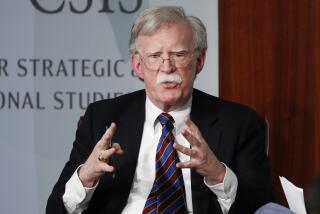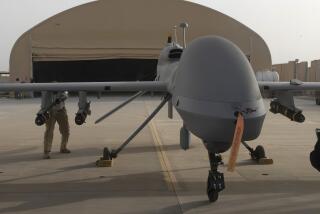U.S. Kills an Aide to Terror Suspect in Iraq
- Share via
BAGHDAD — U.S. troops killed a lieutenant of Abu Musab Zarqawi, the Jordanian accused of leading a terrorist campaign in Iraq, during a firefight last week west of Baghdad, occupation officials said Tuesday.
The slain suspect, identified only by the alias Abu Mohammed Hamza, was an expert bomb maker for Zarqawi’s network, U.S. officials said. His death suggests that U.S. troops may be closing in on Zarqawi, who is suspected of having ties to Al Qaeda.
U.S. officials, who have accused Zarqawi of masterminding an onslaught of suicide bombings against American and Iraqi targets, two weeks ago raised the reward for his capture to $10 million.
“Obviously we are still in hot pursuit of Mr. Zarqawi,” Dan Senor, a spokesman for the U.S.-led coalition, said Tuesday.
Hamza was killed Thursday night near Habbaniya, a stronghold of Sunni Muslims active in Iraq’s insurgency. But the incident was not made public until Tuesday, and there were conflicting accounts about what led to the gun battle.
The commander of the 82nd Airborne Division, Maj. Gen. Charles H. Swannack Jr., told reporters Tuesday that his troops had carried out “a raid on a terrorist safe house.”
But at a briefing later, other U.S. officials described the incident as a chance encounter. They said an armored platoon stumbled onto Hamza’s hide-out during a civil affairs mission as they passed out leaflets and talked to townspeople.
When the men knocked on the door of a corner house, a man inside opened fire, wounding a soldier, said Maj. Neil Harper, a military spokesman.
“The platoon returned fire, killing the male inside,” Harper said. “Two males ran from the house to another house.” The wounded soldier is in good condition, Harper said.
Aided by Iraqi police, U.S. troops arrested three men in the second house, officials said. In the first house, they found an improvised bomb of the kind used to attack U.S. convoys; a suicide vest rigged with a grenade and ball bearings to create shrapnel; two 5-gallon containers of PE-4 explosive; and chemicals, wires and batteries believed to be bomb components.
In addition, the search turned up photos of Zarqawi and a Jordanian passport bearing an alias used by the man known as Abu Mohammed Hamza, Brig. Gen. Mark Kimmitt said. Investigators have not confirmed Hamza’s nationality, however, and officials did not provide his real name or his age.
Hamza was “an explosives expert,” Kimmitt said. His slaying is “a blow to the Zarqawi network, [but] he and his group remain a threat to the security and stability of Iraq.”
According to court documents in an Italian investigation of the Zarqawi network’s recruitment of Iraq-bound militants, Zarqawi’s group has included two Jordanian brothers identified as Abu Atiya -- now in U.S. custody -- and Abu Hamza.
It was not known Tuesday whether the Abu Mohammed Hamza killed in Iraq was the Abu Hamza in the documents, who is described as having been a “member of a group involved in the development and smuggling of toxic weapons.”
According to European court documents and investigators, Zarqawi and his deputies commanded a terrorist camp in Afghanistan that was affiliated with Al Qaeda and specialized in training with poisons and chemical weapons.
After the U.S. invaded Afghanistan in late 2001, Zarqawi -- whose real name is Ahmed Fadhil Nazzar Khalailah -- and his men fled to Chechnya and Iran, then to primitive camps in northern Iraq operated by Ansar al Islam, a Kurdish Islamic extremist group, experts say.
Ansar became one of the organizations aligned with Zarqawi’s network, which has been linked to plots and attacks in London; Paris; Amman, Jordan; and Istanbul, Turkey.
Although U.S. and Kurdish fighters chased Zarqawi’s group from the Ansar camps during the war, he is believed to have regrouped and become an aggressive force in the Iraq insurgency.
Evidence recovered at the scene of the gunfight that killed Hamza, plus information from the arrested men, could aid the manhunt for Zarqawi. And it could help reveal how many terrorist bombings in Iraq can be traced to Zarqawi’s network. Coalition officials have widely publicized a letter believed to have been written by Zarqawi, in which the author claims responsibility for 25 “martyrdom operations” in Iraq.
But some investigators and experts think U.S. and Iraqi officials have overemphasized and oversimplified the image of Zarqawi as supreme commander of a monolithic terrorist network. Zarqawi may have taken credit for more attacks than he has carried out, said Claude Moniquet, head of a Belgian think tank on terrorism and security issues.
“It could be Arab war poetry,” he said. “The psychology is: If I win five battles, I say I won 10.”
More to Read
Sign up for Essential California
The most important California stories and recommendations in your inbox every morning.
You may occasionally receive promotional content from the Los Angeles Times.













